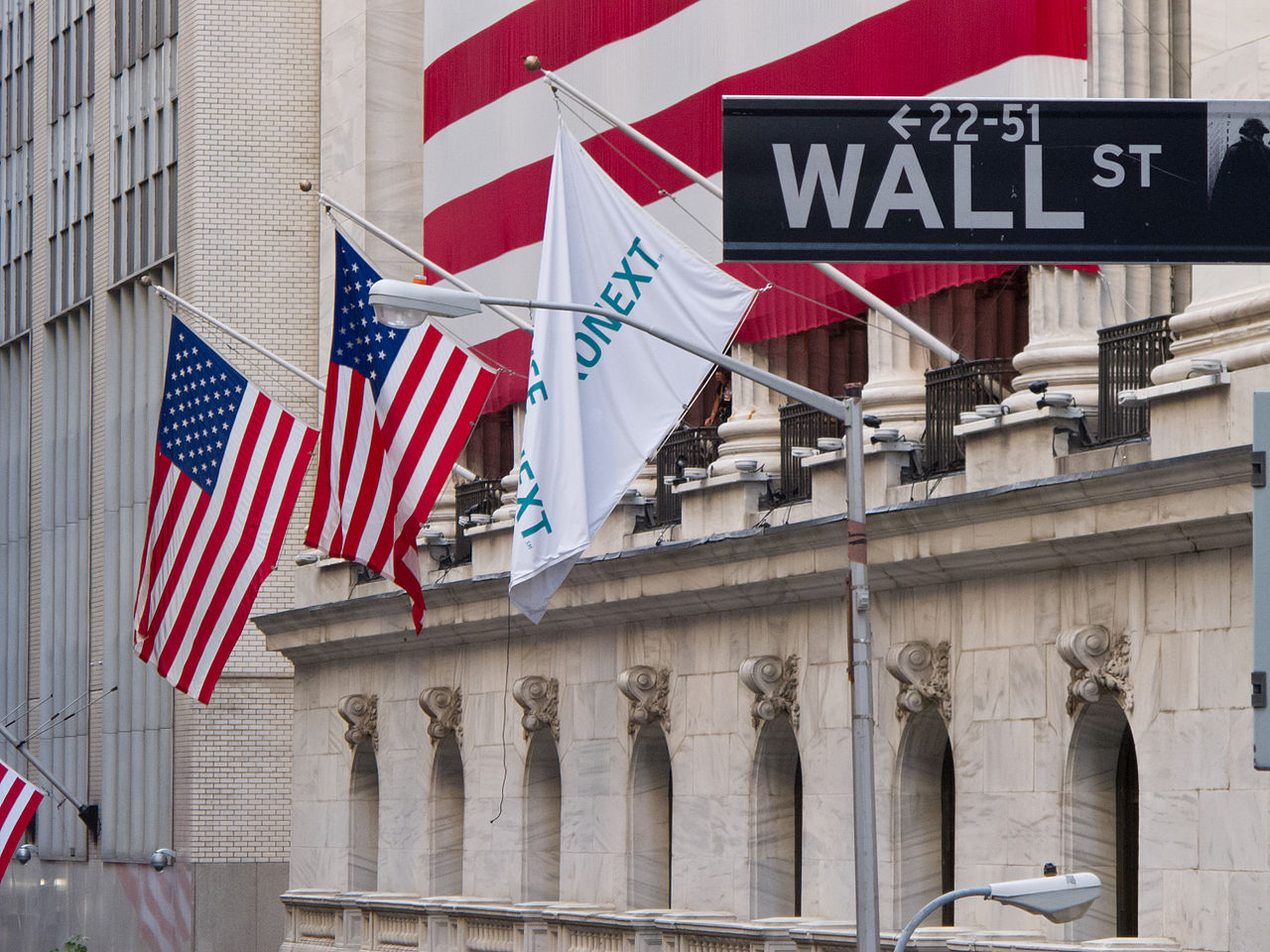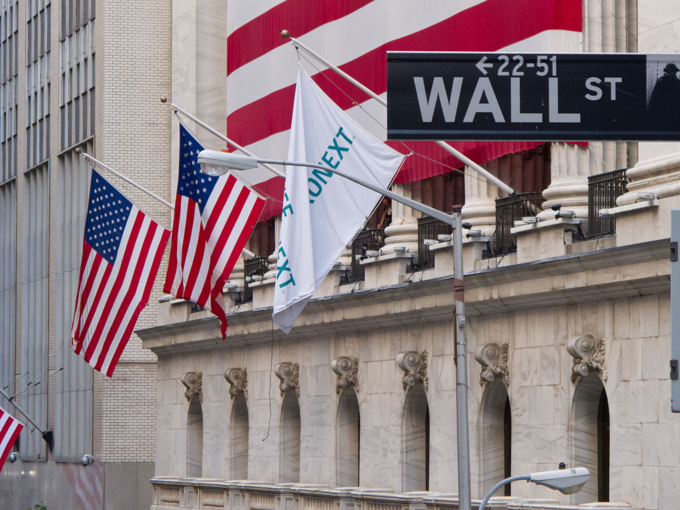Handelsblatt’s list of the world’s most valuable companies by stock market capitalization shows that 58 of the top 100 companies are located in the US. The first 13 feature no country but America, and there hasn’t been better demonstration of microeconomic forces yet.
Apple, Alphabet (Google) and Microsoft with 1.6 trillion euro in total are worth more than all 30 Dax concerns together with aggregated 1.1 trillion euro. This dominant position is widely represented in all industries. First of all, restructured large US banks have returned to their bygone power. The 100 leading concerns include 21 financial institutions. There are twelve American banks, yet no single one of the euro zone. Europe has lost its authority in the rating. The most expensive German company, SAP, is on the 59th place, followed by Siemens on the 65th place.
European enterprises have been waning during several years. The most important stock market barometer, Euro Stoxx 50, captures 40% below its all-time high in 2000. Crisis in the financial and real estate in 2008 resulted in long stagnation or even recession in many southern European countries. The worst consequence was the public debt crisis, which has been depressing stock markets since then.
Situation on Wall Street is quite different. Important stock indexes, such as Dow Jones, S&P 500 and Nasdaq, are hitting records.
Companies from the United States are expanding their dominance
In 2016, investors put their money on all industries, no matter large or both. Blue Chips marched in step with manufacturer of construction machines Caterpillar and oil giant Chevron. By the way, both of them gained more than 30%. Even Russell 2000, which features even medium US companies, is documenting a record level. This year alone, US stocks have won an average of 12%, and the Dow gained 15%. At the same time, Euro Stoxx 50 lost 5%.
The Anglo-Saxon financial markets measure value not by turnover, profit and profitability, but by stock market capitalization. In this relation, the Americans are shining brightly: 58 of the 100 strongest public companies are located in the US. There were 39 of them four years ago
However, American companies are not just valuable. They also sell the largest number of products and services, earn the most money and are the most economically efficient. Thus, Corporate America lives up to its leading position, and its trade and conservative balance rules.
The world’s leading trio, Apple’s iPhone, Alphabet’s Google and Microsoft software, are about to earn 80 billion euro in 2016. This generally corresponds to total annual gross domestic product of a country like Slovakia.
More than a quarter the 100 leaders in 2016 will receive net proceeds of approximately more than 10 billion euro. Of them, 18 corporations are from the US, seven - from Asia, and two – from Switzerland. No one from the euro zone will be able to achieve such a result in 2016.
In the last year, the ten largest banks in the US soared, their net profit jumped by 30% to almost 110 billion euro - 40 billion euro more than in the pre-crisis year 2007. Above that, JP Morgan Chase, Wells Fargo, Bank of America again recorded double-digit billions in 2016.
European big banks, by contrast, are still far from having reached pre-crisis level. The situation is much worse for them since their competitors in the United States can extract greater benefit from the boom in business borrowing at low interest rates. After the financial crisis, American institutions hastily increased their own capital, restructured and generally became stronger. By contrast, this process has been lasting for years in Europe.
The most prestigious industry is the technology sector with California's Silicon Valley, a haven of innovation and home for many worldwide-known companies. Google and Amazon, and also Microsoft, Intel, IBM, Oracle, and, of course, Facebook reign on the world’s market. They hire the best developers in the world and attract brave investors who put their money in newborn companies - a kind of Perpetuum mobile.
source: handelsblatt.com
Apple, Alphabet (Google) and Microsoft with 1.6 trillion euro in total are worth more than all 30 Dax concerns together with aggregated 1.1 trillion euro. This dominant position is widely represented in all industries. First of all, restructured large US banks have returned to their bygone power. The 100 leading concerns include 21 financial institutions. There are twelve American banks, yet no single one of the euro zone. Europe has lost its authority in the rating. The most expensive German company, SAP, is on the 59th place, followed by Siemens on the 65th place.
European enterprises have been waning during several years. The most important stock market barometer, Euro Stoxx 50, captures 40% below its all-time high in 2000. Crisis in the financial and real estate in 2008 resulted in long stagnation or even recession in many southern European countries. The worst consequence was the public debt crisis, which has been depressing stock markets since then.
Situation on Wall Street is quite different. Important stock indexes, such as Dow Jones, S&P 500 and Nasdaq, are hitting records.
Companies from the United States are expanding their dominance
In 2016, investors put their money on all industries, no matter large or both. Blue Chips marched in step with manufacturer of construction machines Caterpillar and oil giant Chevron. By the way, both of them gained more than 30%. Even Russell 2000, which features even medium US companies, is documenting a record level. This year alone, US stocks have won an average of 12%, and the Dow gained 15%. At the same time, Euro Stoxx 50 lost 5%.
The Anglo-Saxon financial markets measure value not by turnover, profit and profitability, but by stock market capitalization. In this relation, the Americans are shining brightly: 58 of the 100 strongest public companies are located in the US. There were 39 of them four years ago
However, American companies are not just valuable. They also sell the largest number of products and services, earn the most money and are the most economically efficient. Thus, Corporate America lives up to its leading position, and its trade and conservative balance rules.
The world’s leading trio, Apple’s iPhone, Alphabet’s Google and Microsoft software, are about to earn 80 billion euro in 2016. This generally corresponds to total annual gross domestic product of a country like Slovakia.
More than a quarter the 100 leaders in 2016 will receive net proceeds of approximately more than 10 billion euro. Of them, 18 corporations are from the US, seven - from Asia, and two – from Switzerland. No one from the euro zone will be able to achieve such a result in 2016.
In the last year, the ten largest banks in the US soared, their net profit jumped by 30% to almost 110 billion euro - 40 billion euro more than in the pre-crisis year 2007. Above that, JP Morgan Chase, Wells Fargo, Bank of America again recorded double-digit billions in 2016.
European big banks, by contrast, are still far from having reached pre-crisis level. The situation is much worse for them since their competitors in the United States can extract greater benefit from the boom in business borrowing at low interest rates. After the financial crisis, American institutions hastily increased their own capital, restructured and generally became stronger. By contrast, this process has been lasting for years in Europe.
The most prestigious industry is the technology sector with California's Silicon Valley, a haven of innovation and home for many worldwide-known companies. Google and Amazon, and also Microsoft, Intel, IBM, Oracle, and, of course, Facebook reign on the world’s market. They hire the best developers in the world and attract brave investors who put their money in newborn companies - a kind of Perpetuum mobile.
source: handelsblatt.com



















